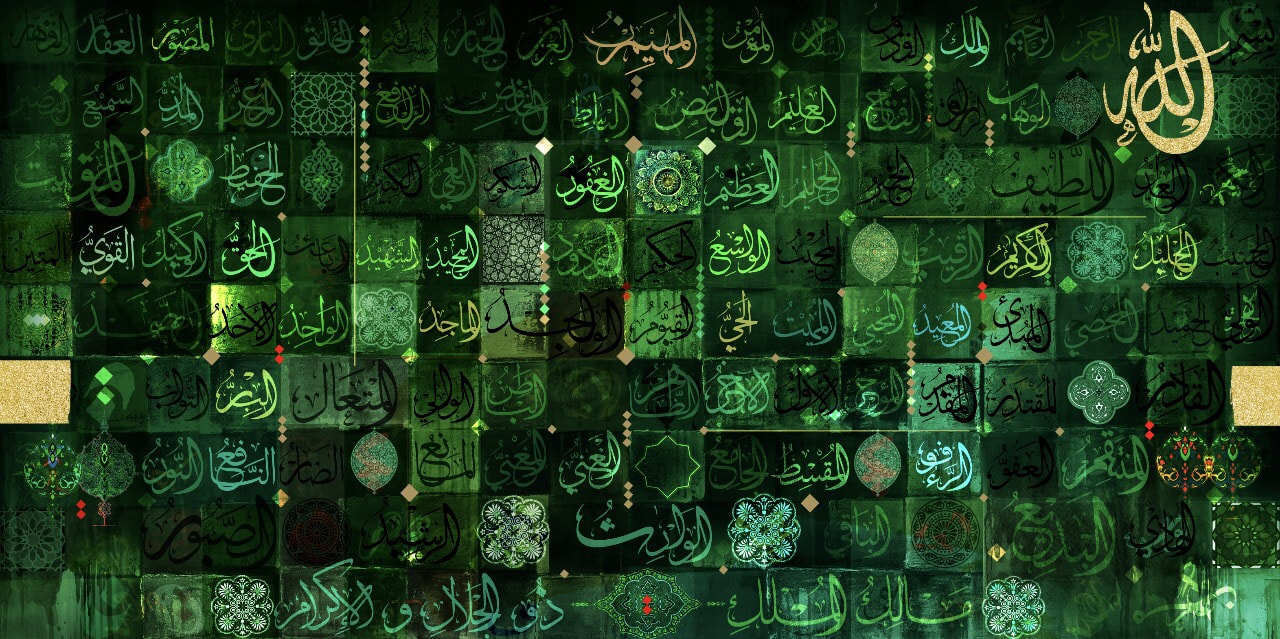 Why are the Divine Names of Allah ﷻ important? The 99 divine names of Allah ﷻ are highly important in Islam. If one observes the religious history of humankind, we may notice that ancient civilizations such as Hindu, Greek, Roman, and Egyptian influenced by paganism, had some sort of association with a god or goddesses for all sorts of their needs, in times of trouble and happiness. There was a god for luck, god for rain, god for wind, god that controlled fire, another one that ruled over the stars and then there was one that ruled over mountains. There was a god for life and a god for death. This inner natural tendency within humans to seek help from a power greater than their own in matters pertaining to their individual and collective needs is what shaped the concepts of paganism in humankind’s religious history. In order to prevent people’s thoughts from seeking plurality in their assistance from a higher power which corrupts the purity of concept of One Power, Allah ﷻ always send Prophets to correct people’s beliefs and to remind them that they should seek all assistance and help from The One, rather than forming mythological beliefs and dividing the authority of a supreme power. The pagans once taunted the Prophet ﷺ when he was invoking two of Allah’s beautiful divine names or attributes called Ar-Rahman (Most Gracious) and Ar-Raheem (Most Merciful), thinking that he was invoking other gods with Allah ﷻ: One of the idolaters heard the Prophet ﷺ saying when he was prostrating: "O Most Gracious, O Most Merciful." The idolater said "he claims to pray to One, but he is praying to two!" Then Allah revealed the following verse: "(Al Quran 17:110) Say (O Prophet): Invoke Allah or invoke Ar-Rahman (Most Gracious), by whatever name you invoke Him (it is the same), for to Him belong the Most Beautiful Names.”[1] This incident was to teach the pagans and entire humankind to seek assistance from the One who controls all, such as your destiny, your rewards and blessings, your sustenance in this world and in the hereafter, your forgiveness and protection in this life and in the afterlife. The One Who is generous, kind, seek help of the One who controls life, death and everything, so worship Him alone with no association whatsoever. In order to keep the concept of One Deity pure it makes perfect sense that Allah ﷻ taught us His various divine names with which we seek His assistance for each need and place our complete trust in Him rather than any other living or non-living entity. For something special we will make dua (supplication) and invoke the name Al-Wahhab (The Generous Giver), for seeking forgiveness for our sins and mistakes, we invoke Al-Ghafoor (The Forgiving), for something we are in need of we invoke through His grace and mercy reciting names such as Ar-Rahman (Most Gracious) and Ar-Raheem (Most Merciful) and so on. The 99 divine names of Allah ﷻ are found throughout the Quran. One instance where couple of them are mentioned together is in Surah Al Hashr, the 59 chapter of the Quran: “He is the Lord of Mercy (Al Rahman), the Giver of Mercy (Al Raheem). He is God: there is no god other than Him, the Controller (Al Malik), the Holy One (Al Qudoos), Source of Peace (As Salaam), Granter of Security (Al Mumin), Guardian over all (Al Muhaymin), the Almighty (Al Azeez), the Compeller (Al Jabbar), the Truly Great (Al Mutakabbir); He is Allah, The Creator (Al Khaliq), The Initiator (Al Bari), The Supreme Fashioner (Al Musawwir). To Him (belong) the Fairest Names. Whatever is in the heavens and the earth extols to Him, and He is The Ever-Mighty (Al Azeez), The Ever-Wise (Al Hakeem).”[2] References: [1] Surah Isra - I. I. Kathir 2003 [2] Al Quran 59:22-24
2 Comments
Zaid Shah
9/11/2023 05:32:51 pm
Thank you for visiting and commenting.
Reply
Leave a Reply. |
Author
Zaid Shaw ArchivesCategories
All
|
Proudly powered by Weebly
 RSS Feed
RSS Feed